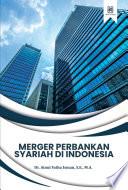Perbankan syariah mulai berkembang sejak pendirian bank syariah pertama pada tahun 1990. Sejak itu perkembangan perbankan syariah di Indonesia terus mengalami peningkatan dan telah menjadi tolak ukur keberhasilan eksistensi ekonomi syariah. Namun di era persaingan bisnis global seperti sekarang mengkehendaki perbankan syariah melaksanakan berbagai strategi untuk meningkatkan kinerjanya. Salah satu strategi dengan melakukan merger atau penggabungan perbankan syariah. Perbankan syariah perlu merujuk pada konsep dasar falsafah ekonomi Islam. Filsafat ekonomi Islam didasarkan pada konsep triangle yakni filsafat Tuhan, manusia, dan alam. Dimensi falsafah inilah yang membedakan ekonomi Islam dengan sistem lainnya, termasuk dalam dunia perbankan syariah. Bank syariah tidak semata bertujuan untuk mencari keuntungan, namun mempunyai tanggung jawab lain yang lebih besar yakni eksistensinya dapat berkontribusi positif kepada kesejahteraan, keadilan, dan kemaslahatan. Falsafah tersebut dapat tercermin dari praktik perbankan syariah pada implementasi Sharia compliance, orientasi sosial dan pemberdayaan ekonominya. Kinerja keuangan, sharia compliance, social fund, dan economic empowerment merupakan esensi perbankan syariah dan menjadi dasar yang perlu mendapatkan telaah lebih lanjut pasca kebijakan merger. Buku ini menguraikannya secara komprehensif sehingga mampu menghadirkan paradigma yang berbeda terkait kebijakan merger perbankan syariah di Indonesia.
Buku ini menguraikannya secara komprehensif sehingga mampu menghadirkan paradigma yang berbeda terkait kebijakan merger perbankan syariah di Indonesia.










